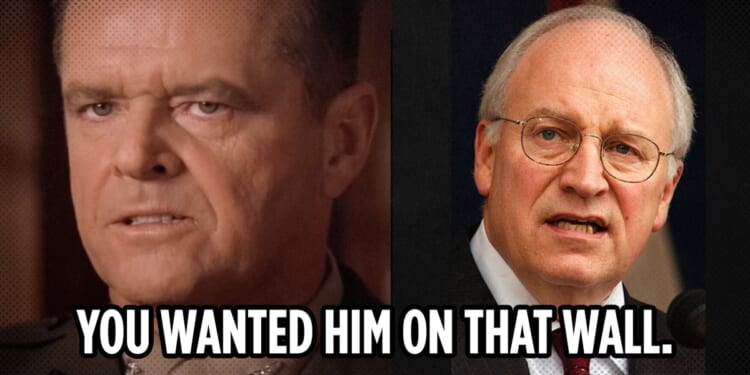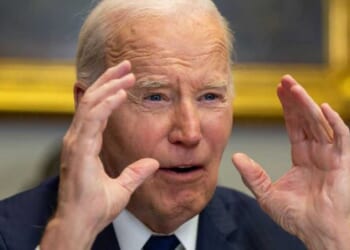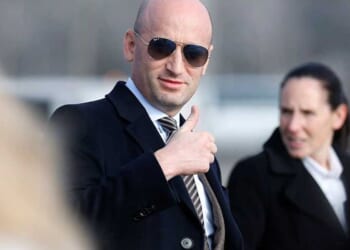The boss gave me my choice of topics this morning. I chose Dick Cheney, and I’m grateful for it. Somehow, nothing else in today’s headlines — not election day in New York and California, not the record-long Schumer Shutdown, not the Democrat-driven outrage of free healthcare for illegal aliens, not the unhinged rantings of Nancy Pelosi — moves me and interests me in the way that the death of this 84-year-old former vice president does.
How about you? Say this about our nation’s 46th vice president: He doesn’t cause us to shrug our shoulders. We have our strongly held opinions, and we have them in spades.
First, let’s acknowledge what a productive and spectacularly consequential life he lived. He served five terms in the House, and he was Richard Nixon’s chief of staff at age 34. Think about that for a moment. Think about what you were doing at age 34. He was also elected as a member of the Republican House leadership as a freshman congressman. That’s how much his colleagues thought of him.
Here’s his former boss, former President George W. Bush, on the death of his faithful two-term vice president at 84: “The death of Richard B. Cheney is a loss to the nation and a sorrow to his friends. Laura and I will remember Dick Cheney for the decent, honorable man that he was. History will remember him as among the finest public servants of his generation — a patriot who brought integrity, high Intelligence, and seriousness of purpose to every position he held.”
As defense secretary under George H.W. Bush, Cheney oversaw Operation Desert Storm, the resoundingly one-sided war that booted Saddam Hussein out of Kuwait while at the same time helping the world’s most powerful nation shake off its Vietnam Syndrome. At the time, a famously reticent Cheney allowed himself a rare opportunity to spike the football: “Saddam Hussein promised that he would conduct the Mother of All Battles. Obviously, it looks like what’s happened is that the Mother of All Battles has turned into the Mother of All Retreats.”
At the time, a vocal minority of folks said we should’ve gone all the way to Baghdad and rid the world of Saddam once and for all. But that wasn’t part of the mission statement. And that omission changed the trajectory of Dick Cheney’s life because it left open the possibility of going back into Iraq. Which we did, with disastrous results.
Heart troubles plagued Cheney all his adult life. He suffered the first of five heart attacks at age 37. Many of us, given that grim reality, would’ve found something less stressful to do than work within the highest corridors of geopolitical power. But not Cheney. He wanted, as Teddy Roosevelt put it, to be in the arena.
The defining moment of Cheney’s political life isn’t hard to pinpoint: It’s 9/11. Think about the days after the attack. And now think about how reassured you were to know that Dick Cheney was there, right next to an untested former Texas governor.
History wasn’t kind to Cheney in his prosecution of the War on Terror. Here’s how The Washington Post broke the news: “Former vice president Dick Cheney, who became chief architect of a post-9/11 war on terrorism that involved bypassing restrictions against torture and domestic espionage, died Monday night.”
That’s an all-too predictable swipe about “bypassing restrictions against torture and domestic espionage,” isn’t it? But those are the hard decisions that someone has to make when the overriding goal is to keep the homeland and the citizenry safe. It’s the old ticking time-bomb argument, and I know what side of it I’m on. And I have a pretty good idea what side Donald Trump is on, too.
Cheney is famous for many things, one of them being his having shared the stage during one of the all-time great political hot-mic moments. It was during the 2000 political campaign, in Naperville, Illinois, on September 4, 2000, that presidential candidate George W. Bush leaned over to his running mate and said, “There’s Adam Clymer, Major League a**hole from The New York Times.” To which Cheney replied, Oh, yeah, he is. Big time.“
Cheney was a public servant for half a century. Think of the skill, the brains, and the temperament required to have been in the arena for that long. Think about having been selected as the presidential chief of staff at age 34. For Gerald R. Ford. At an indescribably tough time for our country, the post-Vietnam and post-Watergate years.
Said former White House Deputy Chief of Staff and Bush strategist Karl Rove, “He was a great and good man, and served our country with great dedication for years. … He was made a member of the Republican House leadership as a freshman Republican, there was such enormous respect for him.”
Interestingly, Rove was against George W. Bush naming Cheney as his running mate. Very much so. And, as Rove told it on Fox News this morning, Bush invited him to the Texas governor’s mansion to make the case against Cheney. “You don’t need to worry about Wyoming,” Rove said, “the guy had his first heart attack at 37. … We’ve worked really hard to develop the image of you as your own man, not Mini Me to your dad. … The guy [is] the leader of the largest oilfield service company [Halliburton] in the world.”
After a vigorous back-and-forth, the then-governor told Rove he’d made “a really good case,” then Bush turned to the guy sitting next to him and said, “Dick, got any questions for Karl?”
Cheney had been in the room the whole time, on the receiving end of all the reasons why he shouldn’t be selected as Bush’s running mate. And to his credit, says Rove, Cheney said afterward, “I agree with some of what you had to say.”
In the end, Bush wanted someone who would tell him what he needed to hear, not what he wanted to hear. And that was Dick Cheney. As for whether Cheney was running the White House behind the scenes, Rove says it was utter bunk. He said Cheney knew exactly who the president was, and he encouraged competing opinions from all around him.
Bush, said Rove, wanted to surround himself with people who would give him their input “with the bark off.” And that was Cheney.
In the post-Obama years, Cheney’s life turned dramatically. There’s no nice way to say it, so I’ll just say it: He went berserk with Trump Derangement Syndrome, and he poisoned an otherwise deeply patriotic legacy, which culminated in a vote for Kamala Harris in the 2024 presidential election. Still, Dick Cheney was perhaps the most influential vice president in American history, and certainly the most influential in our lifetimes.
For a moment, think about Dick Cheney’s life in totality. Think about that second plane, as Martin Amis put it, “sharking in low,” and then smearing itself into the South Tower. Think about how horrific that moment was. And then think about your thoughts in the aftermath, as the ruins of the World Trade Center and the Pentagon smoldered for days. Think about that massive crater in that field in Shanksville. And remember how relieved you felt that Dick Cheney was there advising the untested son of George H.W. Bush.
Dick Cheney was The Dark Knight during those eight years. He was Jack Nicholson’s Colonel Jessup in “A Few Good Men,” sneering at the liberal media, and the Democrats, and telling them that deep down in places they don’t want to talk about, they wanted him on that wall. That was Dick Cheney.
And that’s the Cheney I’ll choose to remember — not the guy who helped oversee an absolutely ruinous war in Iraq rather than going in, wrecking the regime, turning over Saddam to the Iraqi people, and getting the hell out. Not the Trump-deranged lunatic of his later years, the one who cast a spectacularly idiotic vote for Kamala Harris in the 2024 election, but the highly accomplished and deeply patriotic American who stood on that wall for us during one of our nation’s darkest hours.
Today, I’ll remember the former Dick Cheney — the great American Patriot.
















